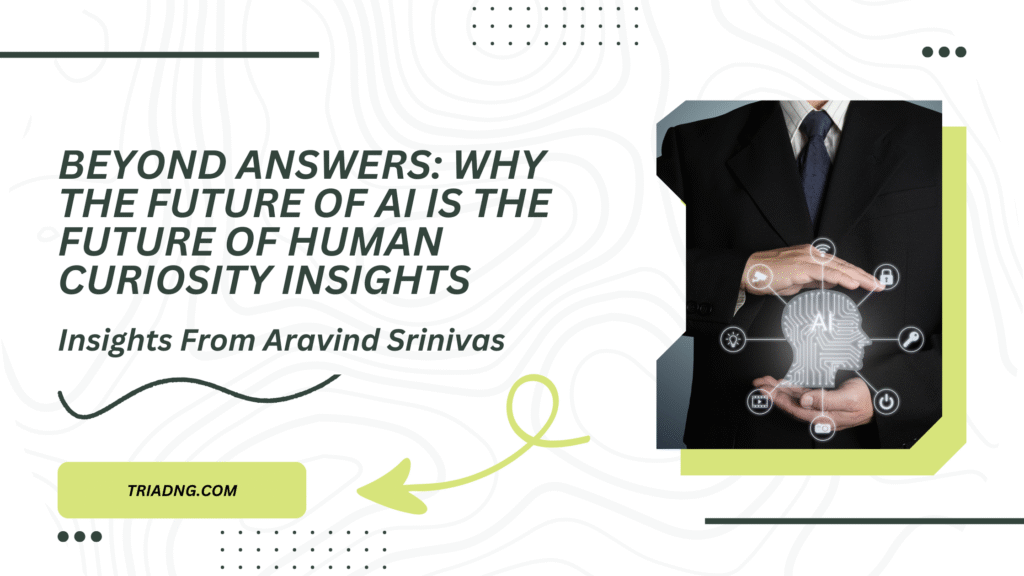Beyond Answers: Why the Future of AI Is the Future of Human Curiosity Insights From Perplexity CEO Aravind Srinivas

What is the future of AI? It’s a question that dominates conversations in tech, business, and beyond. We often think of AI in terms of its outputs—smarter search, faster analysis, and better answers. But what if the true revolution isn’t about the answers AI gives us, but about the questions it empowers us to ask?
At TRIAD, we see this shift firsthand. While groundbreaking tools are emerging to democratize the world’s knowledge, the real challenge for businesses is applying that knowledge effectively. Our purpose is to provide the operational answers. We implement the AI-driven automations, manage the all-in-one digital marketing, and design the systems that let you focus on asking the next big strategic question for your company.
Inspired by a recent talk from Perplexity CEO Aravind Srinivas, let’s explore how AI is set to amplify our most human trait: curiosity.
From Google’s Vision to Today’s Reality
The idea that AI is the future of search isn’t new. Aravind points to a 2000 interview where Google co-founder Larry Page predicted the ultimate search engine would be AI—a system that understands the web, knows what you want, and gives you the right thing. Nearly 25 years later, that future is arriving.
This vision was born from relentless questioning, a practice Srinivas, a PhD in AI from Berkeley, argues is fundamental to human progress. It’s the Socratic method of inquiry that has driven intellect for a thousand years. It’s also the force that created Perplexity. Faced with a barrage of real-world startup questions about SAFE notes, insurance, and SPVs, Srinivas found traditional search engines overwhelming. He needed trusted answers, not just a list of links. The solution was an AI that could research the web and deliver cited, reliable answers, just like an academic paper.
Democratizing Knowledge
This is a profound shift in human history. Until now, access to the best answers was a privilege, reserved for those who could afford access to the world’s greatest minds and libraries.
As Srinivas states, “If a major achievement of the internet was to give everyone access to all of the world’s information, a major achievement of AI would be to give everyone access to all of the world’s answers.” In this new era, it doesn’t matter if you’re a Harvard professor or an underserved student; the quality of answers is the same for everyone. When the marginal cost of research approaches zero, knowledge becomes truly democratized.
The Future is About Better Questions
With AI handling the “what,” we are freed to focus on the “why” and “what if.” The true potential of AI isn’t just to solve known problems, but to unlock new paths of curiosity. For humans, every answer leads to a new set of questions. An answer about health insurance can spawn new inquiries, from specific ideas on how to improve the industry to broader questions about who else could benefit from the technology.
The future of technology, therefore, is not just about the tools we build. It’s about how those tools enhance our innate curiosity. As Srinivas powerfully concludes, “What we really want are those answers that lead us to the next set of questions.”
From Asking Questions to Implementing Answers
As AI makes knowledge universally accessible, the competitive advantage for your business will come from the quality of questions you ask and the speed at which you implement the answers.
Wondering how to reach a global market? Our RSONAT platform for video localization provides a direct path. Asking how to scale your operations efficiently? Our AI-driven automations is the solution.
At TRIAD, we provide the operational backbone that turns your strategic questions into tangible results. While you focus on discovering the next big question, we’ll be here to help you build the answer.
Disclaimer:
This content was inspired by the insights shared in a talk titled “How AI Will Answer Questions We Haven’t Thought to Ask” by Aravind Srinivas, CEO of Perplexity. You can watch the full video here.
We do not claim ownership of the original video or its content. This blog post is a derivative, educational commentary created for informational purposes only, in alignment with fair use guidelines. For complete and original insights, please refer directly to Aravind Srinivas’ content.